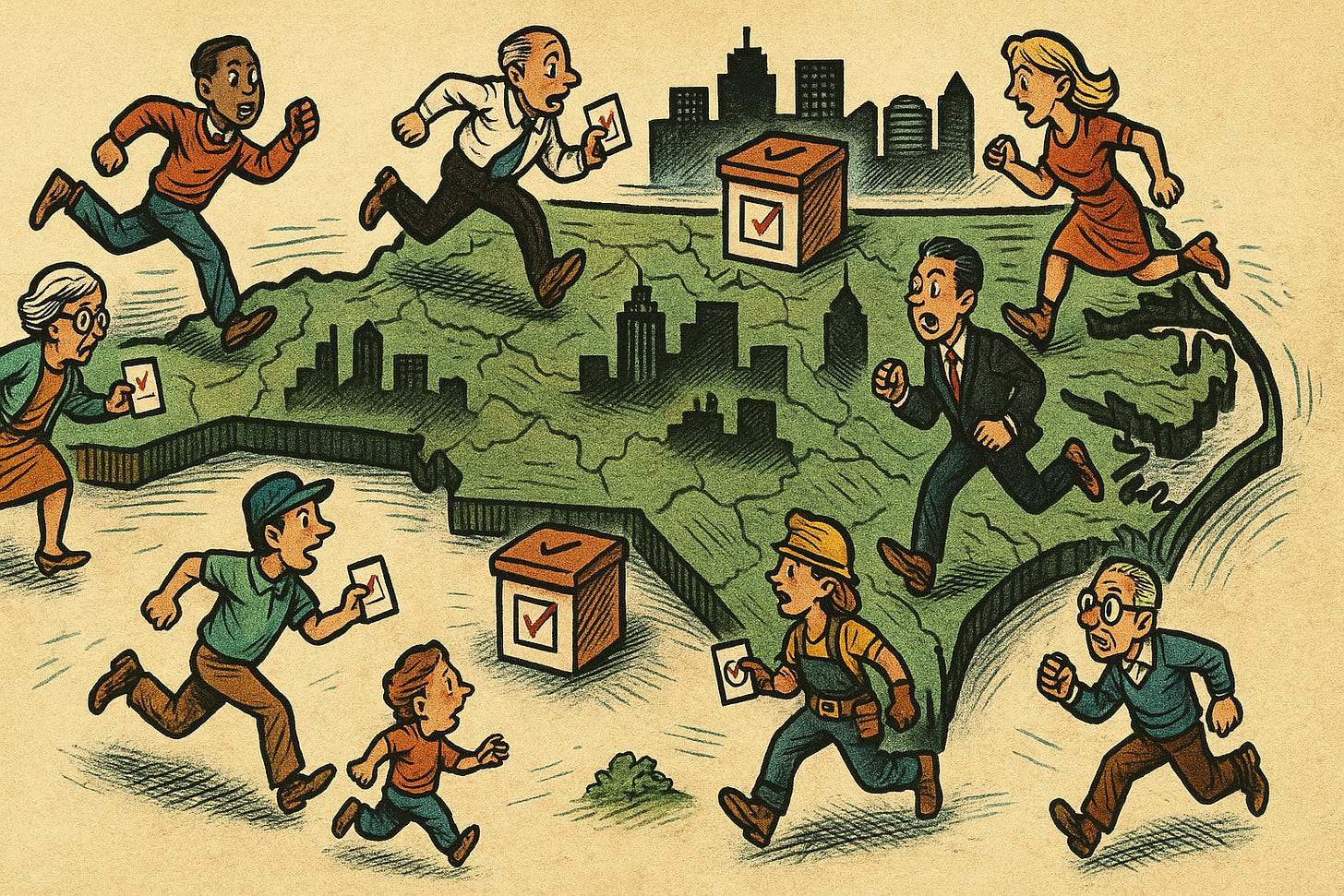8 races I'm watching in tomorrow's election
These quiet, low-turnout races will tell us where North Carolina is headed on safety, taxes, and growth
Most of the political world will have its eyes on Virginia tomorrow, but my attention will be right here in the vale of humility instead.
I love off-year elections. There’s a lot less baked in to the results, and more room for individual candidates to move the needle. Plus, single-digit turnout percentages give us an element of surprise.
It may be quieter, but the stakes are close to home.
Here are eight contests I’m watching on Tuesday and what they’ll tell us about where North Carolina is headed.
1) Charlotte mayor and city council — a referendum on crime
Charlotte is still overwhelmingly blue, but the question this year is whether a string of high‑profile center‑city crimes will move suburban voters.
Vi Lyles has been mayor for years, though there are plenty of more far-left candidates just waiting for their chance to challenge her. Not this year, though. Meanwhile, Republicans have been relegated to the two south Charlotte districts. One is safe this year, the other will be a tough fight.
A good night is Krista Bokhari winning the District 6 seat, keeping a right‑of‑center voice at the dais. A great night is Edwin Peacock III sneaking into the fourth at‑large seat. It’s still a reach, but possible in a low‑turnout year if public safety is a big deal.
An unbelievable night is Republican Terrie Donovan making it genuinely close for mayor, forcing the establishment to reckon with safety and competence in government.
Any way it breaks, we’ll learn how suburban voters — especially in south Charlotte — are reacting to crime concerns and how the city’s political center of gravity is shifting.
2) Charlotte transit tax — how liberal is Charlotte, exactly?
This referendum is the best ideological X‑ray of Charlotte we’ve had in years. The proposed 1% sales tax is projected to raise around $19.4 billion over 30 years under a new regional authority, with a rough 40/40/20 split among roads, rail and bus.
Opposition to the plan is coming mostly from the far left, on predictable complaints of transit not doing enough for low-income communities. A fair number on the right oppose it too, but there just aren’t that many conservatives in Mecklenburg.
A “yes” vote on the tax says pro‑business liberalism still runs the show. A “no” says the left wing of the party is rising in Charlotte.
3) Huntersville mayor — formerly red suburb at an inflection point
Huntersville used to be reliably Republican, but that’s changed — just ask anyone who’s watched House District 98 flip back and forth between Republican John Bradford and Democrat Christy Clark over the past decade.
Clark unseated Bradford in 2018; Bradford won the seat back in 2020 and beat her again in 2022 as the area’s right‑of‑center DNA reasserted itself. Clark won the mayor’s race in 2023, and Democrat Beth Helfrich won a hard-fought race for House 98 in 2024.
All that is the backdrop for a mayoral rematch between Clark and former commissioner Derek Partee, a Republican.
Since 2023, Democrats have held most Huntersville town offices and backed higher property‑tax collections to cover a burst of projects and public‑safety staffing. Partee is running as the brake pedal.
If tax fatigue bites in north Meck and Partee wins, Republicans will see a route to reclaiming board seats and reshaping the 2026 map. If Clark holds, it suggests the Lake Norman suburbs are still evolving toward a pragmatic, transit‑friendly center.
4) Apex town council — how does the mayor‑council rift play out?
The issue here isn’t ideology; it’s control. My hometown of Apex has roughly doubled in population since 2010 and it shows in the traffic and in the politics.
The town has prided itself on “managed growth,” but the 2025 cycle exposed a real rift between Mayor Jacques Gilbert and the council over board appointments, purchasing controls, and the town’s response to last year’s ransomware‑related utility‑billing fiasco.
Eight candidates are chasing three council seats, with voters choosing between more conventional pragmatists and voices more willing to challenge the growth machine — or the mayor. If candidates who pair new housing with concrete timelines for roads and parks win, it marks a maturing suburban consensus that other Wake towns will copy.
5) Wendell town commission — will the town move left or right?
Eastern Wake is booming, and Wendell is one of the fastest-growing towns in the country. Three council seats are on the ballot, and only one incumbent — Deans Eatman — is running. It’s a true local election, with strange bedfellows and unclear allegiances.
There are three basic lanes here, though there’s a decent bit of overlap.
Status‑quo, pro‑growth center‑left: Eatman and Dustin Ingalls, both endorsed by Wake Democrats. This camp generally supports continued housing approvals paired with town investments and services.
Farther‑left, slower growth: B.J. Barham, Kate Benson, and Philip Tarnaski are campaigning together as the “BB&T” slate, and they’ve been more critical of current development pace and posture. Tarnaski is a registered Republican but is not endorsed by the county GOP.
“Smart‑growth” conservatives: Wes Jones and Jorge Cordova carry Wake GOP endorsements but are not running together. Their pitch centers on welcoming growth while tightening execution — faster, clearer permitting, sidewalks and roads, and steady police staffing.
I’m pulling hard for Wes Jones. Republicans need to keep a foothold in the major county suburbs, and a Jones win would anchor a “smart‑growth” lane that welcomes new homes but insists on order and basic services.
6) Durham mayor — a pragmatic model vs. a movement pitch
Durham is North Carolina’s prototypical Democratic city, which makes this race a clean read on which version of Democratic governance is winning right now.
Incumbent Leonardo Williams dominated the primary and is running as the executive who keeps growth on track. Anjanée Bell, daughter of longtime former mayor Bill Bell, represents a populist, farther‑left challenge.
At bottom, it’s a fight over development and style. Bell says the city has favored big projects over people and wants a slower, community‑first approach. Williams argues Durham negotiated real benefits from those developers and needs steady execution to keep housing and jobs coming.
7) Wilmington mayor — could a split hand the win to a Republican?
In a typical year, a Republican for mayor wouldn’t have a prayer. Especially one with Billy Craig’s profile, which makes some mainstream Republicans uneasy. But this isn’t a typical year.
Mayor Bill Saffo has run Wilmington since 2006, usually without serious opposition. What’s different now is that former county commissioner Jonathan Barfield Jr. is competing with Saffo for the same center‑left lane, which gives Craig, a former WPD officer, a narrow opening from the right in a low‑turnout race.
The contrasts are straightforward. Saffo stands for continuity — managed growth and a steady anti‑toll posture on the Cape Fear Memorial Bridge. Barfield largely shares the growth template but pushes harder on affordability and neighborhood impacts. Craig is more of an insurgent, law-and-order candidate.
A newly formed PAC complicated things further with last‑minute mailers boosting a mixed slate including Saffo and two Republican council candidates. It’s an odd, cross‑party twist in a city race where the math could matter.
8) Greensboro mayor — center-left vs. center-right
Greensboro is choosing a successor to Mayor Nancy Vaughan, who’s stepping aside after more than a decade. The nonpartisan primary was close — Democrat Marikay Abuzuaiter edged Republican Robbie Perkins, but not by a lot.
Abuzuaiter has been on the Greensboro City Council council since 2011 and is the current mayor pro tem. Essentially, she’s the continuation of Vaughan.
Perkins served as councilman for 16 years and then mayor for two before losing to Vaughan. His pitch is a throw‑back, business‑first playbook.
What are you watching?
It’s hard to stay on top of all the scores and scores of municipal races, and I guarantee you I’m missing plenty that have import and intrigue. What races are you watching most closely, and why? Hit reply and tell me, or drop a comment below. I read every note.
At a premium
Important reads
Alleged cash-for-vote scheme in Wilmington elections (Carolina Journal)
Can private schools expel children for their parents’ behavior? NC Supreme Court hears arguments (WRAL)
AI’s New Role in the Ground Game: Predicting Influence, Not Just Votes (The Relational Republican Substack)
Witches to Right of Me. Pagans to the Left (Erick Erickson)
Time for another John Birch moment (Carolina Journal)
Top spenders on social media last week
Question of the week
Last week, I asked you whether the new Congressional maps will be a salient issue in 2026. A majority of you said “kind of,” because Democrats will campaign on it. I agree. I don’t think voters care all that much, and it will be old news by next year.
This week, I’ll ask you about Robert Burns, the Monroe mayor who is planning his next steps.




Jefferson Weaver here from Columbuscountynews.com.
Down here in Columbus, the village of Sandyfield is voting on a beer and wine referendum. What's interesting is that there are no businesses in the town of about 400 people. They are in the "fatal funnel" development zone on the Brunswick County line.
Some raging partisan debates are also focusing on flooding in Whiteville. It's fun time to be a newspaperman, even a digital one.
Off year elections are important. Local councils, school boards, and referendums have a direct impact on our lives where we live. I wish we had more interest in this election.
Thank you for your overview of the elections locally. I will vote tomorrow here in Charlotte.